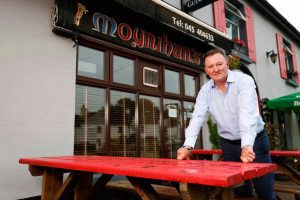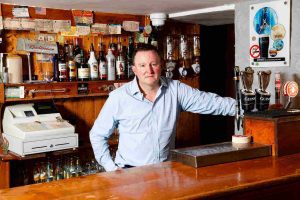“The heart is back beating again for many towns and villages” — Paul Moynihan

Donard’s ‘local’ has been in Paul Moynihan’s family since the 1940s.
Moynihan’s bar sit’s opposite a junction of ways in the County Wicklow village of Donard. A forlorn petrol pump, having long since dispensed its last some 20 years ago, marks the pub’s exterior.
Donard’s ‘local’ has been in Paul Moynihan’s family since the 1940s. Paul’s Dad ran it until 1996 before Paul took over the reins together with his wife Anna and now his son Jack Francis.
“I was reared in the pub” the new Vintners Federation of Ireland President tells me on a quiet nothing-much-happening early June afternoon out in the back beer garden, “then I went to college before going around the world.”
Paul was also involved in the trade in London. His brother still runs a pub in Cambridge and another has now retired from the scene altogether.
“We used be open at half-ten in the morning here and we also sold petrol from the pump outside the pub” remembers Paul, “but now we only open from 5.30 in the evening Monday to Friday and from 2pm on Saturdays and Sundays.”
This cutback in opening hours, perhaps more than anything else over the last 20 years, reflects the national decline in the rural licensed trade as a whole outside the major conurbations which now needs to expand its offering.
Donard’s population of just 500 means that Paul’s customers comprise mainly agricultural, rural types such as farmers and forestry workers as well as Dublin commuters now.
“Like most publicans, we get to know our customers well over the years, what they like and – just as importantly – what they don’t like,” says Paul, “New trends in drinking culture usually start in Dublin then work their way across the country. The average rural publican will spot the trends, take advice from reps and listen to customers. At the end of the day, the customer is always right and will get what they demand.”
Having said that, pints of lager and stout remain hugely popular in rural pubs, he adds.
Forgotten industry
Certainly, Paul feels that the licensed trade was simply forgotten when all this kicked-off back in March 2020.
“We’ve been the longest closed industry,” he points out, “It seemed to us at the start of the pandemic that we were the forgotten industry but the introduction of the Covid Restrictions Support Scheme was a game-changer for most publicans financially.
“And going forward, the Employment Wage Subsidy Scheme to help us get our staff back is a great initiative from the government.”
Staffing shortage
Since the hospitality industry reponed problems in getting staff have made themselves felt.
“During Lockdown a lot of foreign staff simply went home and students fell to drawing Pandemic Unemployment Payments,” he says, “And despite being back open now, they’d prefer to have a social life for the Summer.
“Hopefully we’ll get them back but it’s experienced staff we’re looking for.
“From talking to my fellow publicans, getting hold of chefs seems to be a major issue at the moment with some having been redeployed in other industries.”
Having reopened outdoors, he can see the need for about 50% more staff on top of what he already works with purely to ensure efficient outdoor service.
“You always need someone behind the bar serving but at the same time you currently need orders delivered to the tables in the outside areas,” he explains, adding, “Even when we’re back inside, it won’t affect the need for extra staff as it will still be Summer and people will still want to spread themselves outside as well as inside.”
Pandemic change
The pandemic has accelerated what had been a more gradual evolution for the rural pub.
“The pandemic will bring so many changes to Irish society that we can’t even begin to understand what they’ll mean for the pub. At this stage our priority is to get pubs open indoors and ensure we never return to the profound uncertainty of lockdowns.
“We know people are happy to return to the pub outdoors during fine weather, which is a great shot in the arm for the trade, but we don’t yet know if 16 months of socialising at home will alter the landscape.
“People have got used to the below-cost prices offered by supermarkets so publicans have to meet the challenge head-on, remind people that there’s nothing like the local for meeting up. Who wants to stay at home anymore? We’re all sick of it!
“Long-term, publicans have to ensure their offering stands up to all the other competitors for our discretionary income. It’s not like the 1980s – we have to fight for every customer and it won’t be for the faint-hearted.”

“People have got used to the below-cost prices offered by supermarkets so publicans have to meet the challenge head-on, remind people that there’s nothing like the local for meeting up.”
Of the non-food pub’s future
Studies are saying that takeaway food will be of increased economic value to a premises going forward, says Paul.
“But while food will become increasingly popular there will always be demand for traditional pubs. The rural pub that offers a space away from work and home will always be in demand.
“There’s no doubt that demographics and tastes are changing so it’ll be vital for publicans in traditional venues to ensure their venues reflect what customers want.
“A traditional pub will always be a proud part of our culture but the publican of the future will have to adapt in ways previous generations never had to think about.
“In many ways I can’t even guess what the pub of tomorrow will offer other than the fact that adapting to change will become a constant in the lives of publicans.”
Customers happy out
Encouragingly, Paul envisages a more sanguine future for the rural pub.
“Post-pandemic rural/town pubs might find themselves at something of an advantage in that there’s a degree of decentralisation from offices with people working from home now – and that’s a positive.
“It’s also been said to me that when the pubs were closed during the pandemic it felt like the heart had gone out of a lot of villages around the country, so being open now seems like the heart is back beating again for many towns and villages.”
There’s clearly enthusiasm from customers keen to get back to their local – inside or outside.
“From the pubs that have reopened with outside space we can see such happiness from our customers.”
Presidential priorities
The Federation has fought in crisis mode for the last 16 months, he says, but the VFI remains relevant to the many ongoing issues irrespective of Covid-19’s onslaught.
“It’s important that we’re part of the night-time task force so that we can represent publicans going forward in this,” he offers, outlining a few more topics that will need the Federation’s undivided attention.
“We’re also aware of an initiative being introduced by Heather Humphreys’ Department similar to the ‘Pub is the Hub’ one in the UK for rural pubs to remain relevant in their environment.”
A pilot scheme supporting the use of rural pubs as community spaces and hubs for local services is being considered by the Department of Rural and Community Development as part of its recently-published policy on rural development Our Rural Future – Rural Development Policy 2021-2025.
“The scheme will support publicans who wish to develop new offerings that promote local community involvement and enterprise alongside the traditional pub service. We see this pilot developing into a full-scale programme that will boost the pub’s standing in local communities.
“As I said, the local rural pub will always be a feature of Irish life but this new pilot scheme introduced by Minister Heather Humphries will assist pubs in moving towards where local people want to be.”
There are also insurance issues that have to be dealt with on an ongoing basis, he adds.
“Going forward our licensing laws are going to have to be consolidated under Minister McEntee – so that’s going to be a big issue for the VFI to be part of those discussions over the next six months.
“This could very easily dilute the 7-Day Licence and nobody would like to see that…”.
And Paul Moynihan intends to be there to ensure that such a threatening prospect doesn’t come one inch closer.








